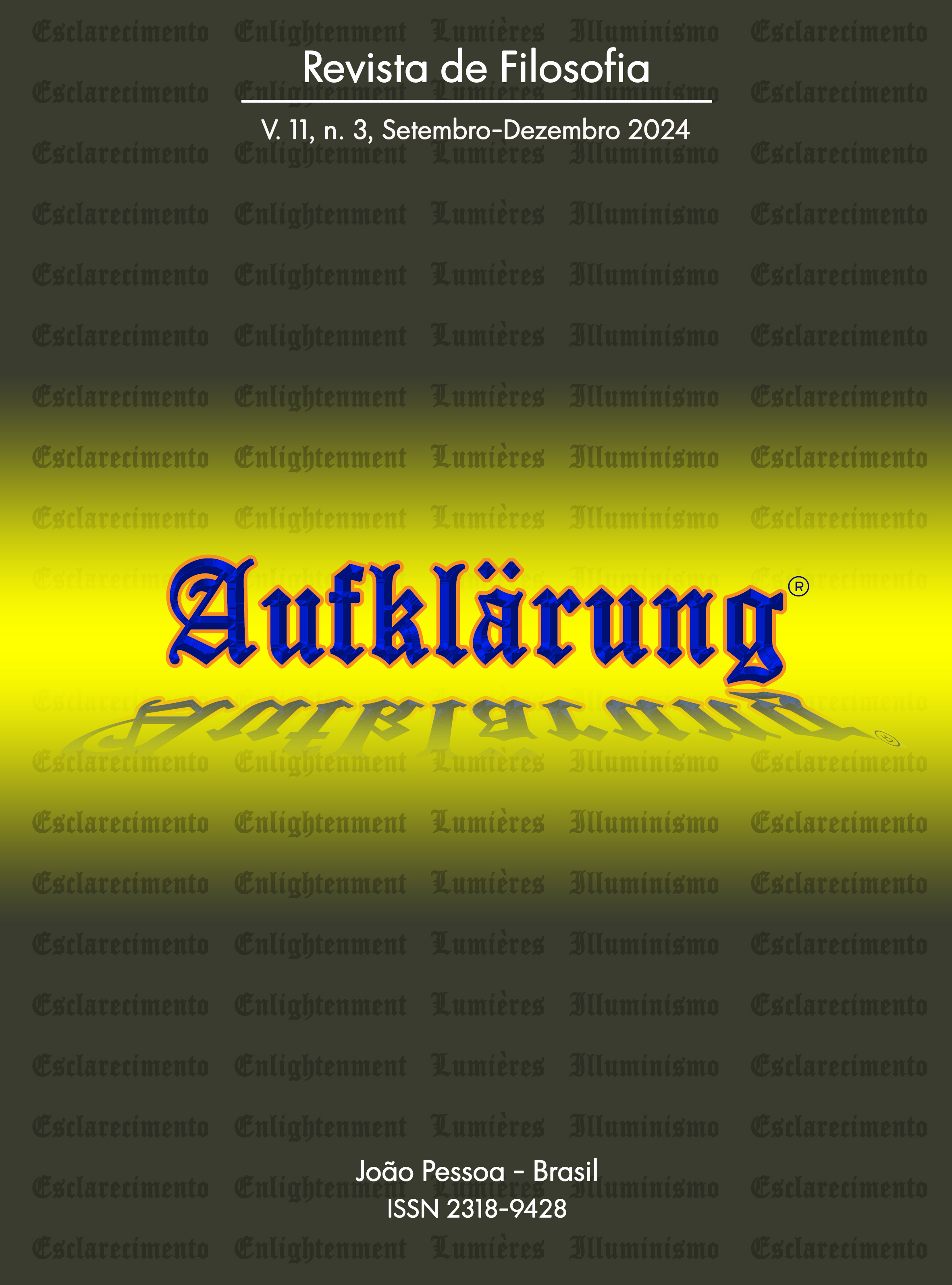Gadamer and the guiding concepts of humanism: between yes and no to Kant
DOI:
https://doi.org/10.18012/arf.v11i3.71268Keywords:
Culture, sensus communis, judgment, tasteAbstract
This paper examines Gadamer's interpretation of Kantian notions of concepts such as culture, sensus communis, judgment, and taste, as presented by Gadamer in Truth and Method, within the context of the guiding concepts of humanism. By contrasting Gadamer's citations of Kant with a broader reading of Kant's texts, as well as Gadamer's comments on Kant, it becomes evident that, although Gadamer extensively draws on Kant and adopts his terminology, he interprets these concepts in Kant differently, even when directly referring to the philosopher. In other words, despite quoting Kant, Gadamer does not adhere to the original meanings that Kant assigned to these terms, instead attributing them with a new significance.
Downloads
References
DELEUZE, Gilles. A Filosofia Crítica de Kant. Tradução Germiniano Franco. Lisboa: Edições 70, 2009.
GADAMER, Hans-Georg. Verdade e método I: traços fundamentais de uma hermenêutica filosófica. Tradução de Paulo Meurer. 12 ed. Petrópolis, RJ: Vozes. Bragança Paulista: Editora Universitária São Francisco, 2012.
KANT, I. Gesammelte Schriften. Hrsg.: Bd. 1-22 Preussische Akademie der Wissenschaften, Bd. 23 Deutsche Akademie der Wissenschaften zu Berlin, ab Bd. 24 Akademie der Wissenschaften zu Göttingen. Berlin 1900ff.
KANT, I. Crítica da Razão Pura. Tradução Valerio Rohden e Udo Baldur Moosburger. Coleção Os Pensadores. São Paulo: Editora Nova Cultural, 1999.
KANT, I. Crítica da Faculdade do Juízo. Trad. António Marques e Valerio Rohden. Segunda ed. Rio de Janeiro: Forence Universitária, 2010.
KANT, I. Crítica da Razão Pura. Trad. Fernando Costa Matos. Petrópolis, RJ: Editora Vozes, Bragança Paulista, SP:_Editora Universitária São Francisco, 2012.
KANT, I. In. Terra, Ricardo R. (Org.) Duas introduções à Crítica do Juízo. Editora Iluminuras, São Paulo – SP, 1995.
KANT, I. Metafísica dos costumes. Trad. [primeira parte] Clélia Aparecida Martins; [segunda parte] Bruno Nadai, Diego Kosbiau e Monique Hulshof. Petrópolis, RJ: Vozes; Bragança Paulista, SP: Editora Universitária São Francisco, 2013.
KANT, I. Observações referentes a Sobre o órgão da alma. Tradução e Notas de Zeljko Loparic. Kant e-Prints – Vol. 2, n. 7, 2003.
LOPARIC, Zeljko. Acerca da sintaxe e da semântica dos juízos de gosto. In. PEREZ, Daniel Omar (Org). Kant no Brasil. São Paulo: Editora Escuta, 2005.
ROCHA, Leandro. O prazer como sentimento de vida em Kant. São Paulo: Liber Ars, 2019.
ROHDEN, Valerio. A função transcendental do Gemüt na Crítica da razão pura. Kriterion vol.50. Belo Horizonte, nº 119, Jun./2009.
ROHDEN, Valerio. As ideias como formas de vida da Razão. In: SANTOS, Leonel Ribeiro dos (Coord.). et al. Was ist der Mensch? Que é o Homem? Centro de Filosofia da Universidade de Lisboa, Lisboa, 2010.
ROHDEN, Valerio. Kant, o ser humano entre natureza e liberdade. In. CARVALHO, Isabel Cristina Moura de; GRÜN, Mauro; TRAJBER, Rachel (Org). Pensar o Ambiente: bases filosóficas para a Educação Ambiental. Brasília: Ministério da Educação, Secretaria de Educação Continuada, Alfabetização e Diversidade, UNESCO, 2007.
ROHDEN, Valerio. O sentido do termo Gemüt em Kant. In. PEREZ, Daniel Omar (Org). Kant no Brasil. São Paulo: Editora Escuta, 2005.
ROHDEN, Valerio. Representações não-conscientes em Kant – versão introdutória. Revista AdVerbum 4 (1) Jan a Jul de 2009.
WOOD, Allen. Kant. Tradução Delamar José Volpato Dutra. Porto Alegre: Artmed, 2008.
Additional Files
Published
How to Cite
Issue
Section
License

This work is licensed under a Creative Commons Attribution 4.0 International License.
Journal general policy
1.This journal works under a Creative Commons License aplied to online journals. That icence can be read in the following link: Creative Commons Attribution 4.0 International (CC BY 4.0).
2.Accordingly to this License, a)the journal declares that authors hold the copyright of their articles without restrictions, and they can archieve them as post-print elsewhere. b)the journal allow the author(s) to retain publishing rights without restrictions.
Metadata Policy for information describing items in the repository
1. Anyone may access the metadata free of charge at anytime.
2.The metadata may be re-used in any medium without prior permission, even commercial purposes provided the OAI Identifier or a link to the original metadata record are given, under the terms of a CC BY license refered for the Journal.







































